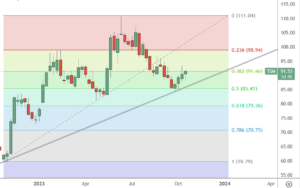Taiwan Semiconductor Corp. (NYSE:TSM) will release its latest earnings report this week.

TSM: Weekly Chart
The Fibonacci levels highlight the potential for TSM after finding support at the 50% retracement level. That has seen the stock move to the 38% level. Strong earnings could power the stock towards the $110 high of June.
Taiwan Semiconductor is expected to report a 30% slump in its third-quarter profit on Thursday, but analysts are predicting strong growth next year as the chip industry comes out of the current downturn.
The world’s largest contract chipmaker is set to report a net profit of T$195.9 billion ($6 billion) for the latest quarter, marking a second straight quarter of profit decline, according to an LSEG. Revenue for the quarter was around $17 billion, according to TSMC figures, down 20% from a year earlier.
Global demand for semiconductors began to weaken last year, but analysts say inventories are running low at smartphones and PC makers, and they are expected to restock. Analysts are likely to be looking at TSMC’s outlook for the fourth quarter in this latest release.
The AI boom has helped to power the company’s stock this year, with TSMC’s Taipei-listed stock surging 23% this year. Estimates put the company’s 2024 revenue growth at around 22%, and any improvement in management’s outlook will be another boost.
TSMC is said to have been nervous about customer demand and told its major suppliers to delay the delivery of high-end chip-making equipment, but only for the short term.
Fubon Securities expects a slow start to next year, with 10% growth in the first quarter, predicting order cancellations and mild restocking demand. Analysts are also concerned that Apple, a major customer, may revise its orders.
“We think the market consensus is still too bullish,” it said in a research note.
Despite some gloom in the outlook, the levels are set, and a possible run to $110 is still possible in the coming week or two.
There was further protectionism in the US on Tuesday, with the Commerce Department tightening its export controls to keep China from acquiring advanced computer chips, possibly used in weapons and artificial intelligence.


